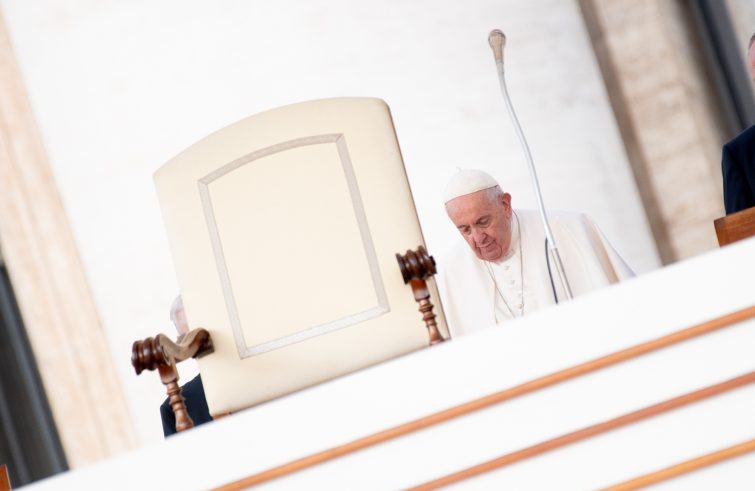
“To avoid any escalation and open the way to a cease-fire and dialogue”: it’s the Pope’s latest appeal for peace in the “tormented Ukraine”, sent out at the end of today’s general audience in St Peter’s Square, centered on desolation as an element of discernment. “A perfect but ‘aseptic’ serenity, without feelings, when it becomes the criterion for decisions and behaviour, makes us inhuman”, Francis said in his opening remarks. “We cannot ignore our feelings”, he continued off-text: “we are human and sentiment is a part of our humanity. And without understanding feelings we are inhuman; without living our sentiments we will also be indifferent to the sufferings of others and incapable of accepting our own.” “Not to mention that such a ‘perfect serenity’ cannot be reached by this path of indifference”, is the Pope’s counsel, guarding against the “sterile distance” of those who say: “I won’t get involved in things, I will keep my distance.” “It is as though we lived in a laboratory, shut away, so as not to have microbes and diseases!”. “Even the spiritual state we call desolation, when in the heart everything is dark, it is sad, these things, this state of desolation can be an opportunity for growth”, Francis assured. Indeed, explained the Holy Father, “if there is not a little dissatisfaction, a little healthy sadness, a healthy capacity to dwell in solitude and to stay by ourselves without fleeing, we risk always remaining on the surface of things and never making contact with the core of our existence.”
“The important choices do not come from the lottery:
they have a price and you have to pay that price. It is a price that you must pay with your heart, it is the price of the decision, the price of making some effort. It is not free of charge, but it is a price within reach of everyone. We must all pay for this decision so as to leave behind the state of indifference. The state of indifference brings us down, always.” Desolation, Francis said, “causes a rousing of the soul: it keeps us alert, it fosters vigilance and humility, and protects us from the winds of fancy.” For many saints, “restlessness was a decisive impetus to turn their lives around”, Francis said quoting Augustine of Hippo, Edith Stein, Joseph Benedict Cottolengo, or Charles de Foucauld. Hence, “artificial serenity will not do”, the Pope pointed out, and “Yes”, he said, “a healthy restlessness is fine” and “desolation is also an invitation to gratuitousness, to not acting always and solely with a view to emotional gratification.”
“Being desolate offers us the possibility of growth, of initiating a more mature, more beautiful relationship with the Lord and with our loved ones, a relationship that is not reduced to a mere exchange of giving and having.”
“Let us think of our childhood,” the invitation: “As children, it often happens that we look for our parents to obtain something from them, a toy, some money to buy an ice cream, permission… And so, we look for them not for themselves, but for personal gain. And yet, the greatest gift is them, our parents, and we understand this gradually as we grow up.
Many of our prayers are also somewhat like this: they are requests for favours addressed to the Lord, without any real interest in him. We go to ask, to ask, to ask the Lord…”.
“The spiritual life is not a technique at our disposal, it is not a programme for inner ‘wellbeing’ that it is up to us to plan”,
the Pope said: “desolation, then, is the clearest response to the objection that the experience of God is a form of wishful thinking, a simple projection of our desires.” “In that case – Francis pointed out – if we think that he is a projection of our desires, we would always be the ones to plan, and we would always be happy and content, like a record that repeats the same music. Instead, those who pray realize that the outcome is unpredictable: experiences and passages from the Bible that have often enthralled us, today, strangely, do not move us. And, equally unexpectedly, experiences, encounters and readings that we have never paid much attention to or preferred to avoid – such as the experience of the cross – bring immense peace.” “To learn to be with the Lord without ulterior motives, exactly as it happens with people we care for: we wish to know them more and more, because it is good to be with them.”
“Do not fear desolation”, Francis concluded off-text: “face it with perseverance, do not evade it. And in desolation, try to find the heart of Christ, to find the Lord. And the answer will come, always.”
Faced with difficulties, therefore, “never be discouraged, please, but confront the test with determination, with the help of the grace of God, which is never lacking.”











